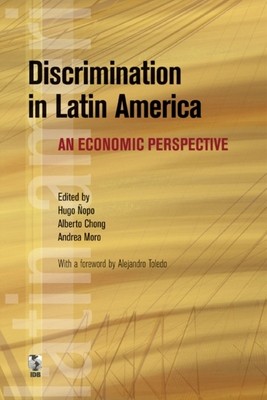
- We will send in 10–14 business days.
- Publisher: World Bank Publications
- ISBN-10: 082137835X
- ISBN-13: 9780821378359
- Format: 15 x 22.6 x 2.3 cm, minkšti viršeliai
- Language: English
- SAVE -10% with code: EXTRA
Discrimination in Latin America (e-book) (used book) | bookbook.eu
Reviews
Description
While there is a strongly held belief that Latin American societies are highly discriminatory, the economic profession has found relatively little evidence for this perception, and until recently other social sciences had prevailed in the discussion of this timely and relevant topic. The development of new tools for analyzing the economic mechanisms underlying discrimination, however, has opened up several avenues for research. This book presents a set of studies on contemporary discrimination in Latin America that takes advantage of these new tools by focusing on social interactions that range from cooperation, group formation, and the impact of migration in poor families to specific markets such as housing and labor. The techniques applied include traditional regression analysis, experimental approaches, and audit studies, as well as structural methods. This wide range of analytical approaches leads to findings that confirm some of the common perceptions regarding discrimination but challenge the conventional wisdom in other regards In some instances the long-held conventional wisdom may not hold at all. Latin Americans do not discriminate more or less than inhabitants of other regions, and the discrimination that does occur appears largely to stem from lack of information on individuals--a result of great interest in colleges and universities that teach courses on Latin American development both at the undergraduate and graduate level. Furthermore, this book's findings extend to the political arena, as they challenge standard policies that have been ineffective for decades. Finally, this book should be of interest to researchers, as the empirical methods employed are at the vanguard of the profession. In fact, in addition to the contribution that this volume makes to the literature on discrimination, it also has the potential to contribute more broadly to labor economics, development economics and experimental economics, as well as to Latin American studies.
EXTRA 10 % discount with code: EXTRA
The promotion ends in 21d.07:09:21
The discount code is valid when purchasing from 10 €. Discounts do not stack.
- Publisher: World Bank Publications
- ISBN-10: 082137835X
- ISBN-13: 9780821378359
- Format: 15 x 22.6 x 2.3 cm, minkšti viršeliai
- Language: English English
While there is a strongly held belief that Latin American societies are highly discriminatory, the economic profession has found relatively little evidence for this perception, and until recently other social sciences had prevailed in the discussion of this timely and relevant topic. The development of new tools for analyzing the economic mechanisms underlying discrimination, however, has opened up several avenues for research. This book presents a set of studies on contemporary discrimination in Latin America that takes advantage of these new tools by focusing on social interactions that range from cooperation, group formation, and the impact of migration in poor families to specific markets such as housing and labor. The techniques applied include traditional regression analysis, experimental approaches, and audit studies, as well as structural methods. This wide range of analytical approaches leads to findings that confirm some of the common perceptions regarding discrimination but challenge the conventional wisdom in other regards In some instances the long-held conventional wisdom may not hold at all. Latin Americans do not discriminate more or less than inhabitants of other regions, and the discrimination that does occur appears largely to stem from lack of information on individuals--a result of great interest in colleges and universities that teach courses on Latin American development both at the undergraduate and graduate level. Furthermore, this book's findings extend to the political arena, as they challenge standard policies that have been ineffective for decades. Finally, this book should be of interest to researchers, as the empirical methods employed are at the vanguard of the profession. In fact, in addition to the contribution that this volume makes to the literature on discrimination, it also has the potential to contribute more broadly to labor economics, development economics and experimental economics, as well as to Latin American studies.


Reviews